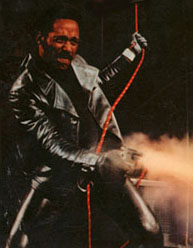I’m not usually a “true crime” reader – being cowardly and superstitious makes one lean more toward books about happier things, like bunny rabbits, or world war – but I just finished reading Inside the Mind of BTK: The True Story Behind the Thirty-Year Hunt for the Notorious Wichita Serial Killer.
BTK is one of the more memorable cases in serial killerdom, given that his murders went unsolved for so long and that he taunted police and the public for years with his messages. But the most interesting part of the whole story is that the man who cracked the case is John Shaft.
Let me back up so you don’t think I’m just making something up. In 2005, Wichita police traced Dennis Rader to BTK’s messages when he sent them a message by floppy disk. They traced the disk to a computer at the church where Rader served as president.
Why did he send them the messages? Because he had begun to trust a member of the Wichita investigation, Police Lieutenant Ken Landwehr, enough to send regular messages.
Why did he trust Lieutenant Landwehr? Because Landwehr had taken on the role of “super-cop,” a role that author John Douglas, MINDHUNTER says he developed as an FBI profiler of violent criminals. The theory goes that the “super-cop” will issue public statements that are written in a way to send certain messages and signals to the suspect. This draws the suspect out and encourages him/her to communicate with the police (which is exactly what happened in this case).
And how did John Douglas, MINDHUNTER, come up with the concept of the “super-cop” role? Let’s go to page 94 of the book, where he’s watching reruns and happens upon Shaft:
For the next ninety minutes I stared into the flickering TV screen, not exactly sure why I was so mesmerized by the movie. But somewhere in the back of my head, a voice told me to sit back, pay attention and enjoy the show. I liked Shaft. He kicked a lot of butt, bedded a bunch of women, and still managed to look like a million bucks the whole time. Something about his no-holds-barred approach to cracking that kidnapping case so crucial to the movie’s plot felt strangely inspiring.
“I bet he could catch BTK,” I mumbled. “Maybe I oughta call up the task force in Wichita and tell them that what they really need is Shaft, super-detective.”
…
Maybe the idea wasn’t so absurd. The local police didn’t need a super-detective. What they really needed was a super-cop, someone who could crawl inside our [suspect’s] mind and gently steer him in the direction we wanted him to go.
And thus came the concept of the super-cop, which led to the eventual arrest and conviction of the man who’d terrorized Wichita for decades.
As the song says, who’s the cat that won’t cop out when there’s danger all about?
Right on!

